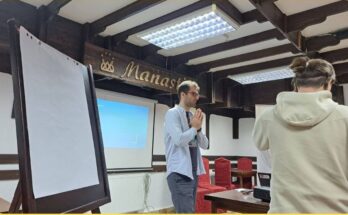Supporting a free Belarus is not only the EU’s moral obligation, but it lies in our geopolitical interest. To counter authoritarianism and offer Belarusians a way forward, we must start acting as a single democratic power by developing a fully-fledged foreign, migration and security policy that is free from national vetoes.
A year ago, freedom and democracy were once again stolen from Belarusians by dictator Alyaksandr Lukashenka. Since then, they have been peacefully opposing the manipulations and brutality of the regime, while inspiring the rest of Europe with their perseverance. Respect for democracy, the rule of law and human rights are the fundamental European values and we can’t rest until at least our whole continent respects them. Belarusians are at the forefront of the global fight for human dignity, and other Europeans, many of them living in historically hard-won democracies, owe them all the support they can give.
So far, however, our collective record of helping Belarusians has been patchy. Despite its small size and capacity, Lithuania has taken the lead in this effort by offering asylum to Ms Tsikhanouskaya and her team, imposing sanctions before the fist EU’s punitive measures and advocating for Europe’s support for a democratic Belarus. The rest of the Union has slowly followed, introducing four rounds of sanctions and presenting economic recovery plans. However, the Union needed a ‘tip of the iceberg’ case of state-led hijacking of the Ryanair flight FR4978 on 23 May 2021 to react decidedly against the regime that has been falsifying the results of elections, beating protesters and torturing political prisoners for nearly three decades.
Allowing this to continuously happen in its very neighbourhood, the EU is not only failing in the moral dimension, but also as a geopolitical actor. Offering a peaceful and mutually beneficial platform for political integration coupled with decisive sanctions against Lukashenka’s regime should be a natural counterbalance to the authoritarian influence model implemented by the Kremlin. There is no vacuum in geopolitics – all our divisions and weaknesses in external action are used by authoritarian regimes to strengthen their grip on power at the national and regional level. This is why the EU must go beyond its intergovernmental taboos and develop a fully-fledged foreign and security policy in order to fully use its political potential and offer Belarusians a viable alternative to dictatorship.
The recent crisis on the Lithuanian-Belarusian border starkly exposes the weakness of the politically divided EU. Asylum seekers and migrants are instrumentally used by the Belarusian regime to put pressure on Vilnius in an act of revenge for its support to a democratic Belarus. Dictators like Lukashenka, Putin and Erdoğan know very well how to cynically exploit the Union’s lack of a common migration policy, while also trying to compromise the EU and its members in the eyes of their citizens.
Until we have the capacity to impose swift and effective sanctions while also being able to receive and relocate asylum seekers across the EU in a humanitarian way, we will be susceptible to constant blackmail from undemocratic powers. Our disunity makes Member States like Lithuania and the entire European Union directly vulnerable to destabilisation efforts of hostile regimes and shows our collective weakness to the Kremlin in the bigger geopolitical game.
Approximately three-quarters of the European citizens support a common approach of the EU to foreign policy1, security and defence2, and migration3. The ongoing Conference on the Future of Europe (CoFoE) is an opportunity for us to demand a stronger EU both in the moral and geopolitical dimension, when our politicians are failing on both fronts. Together, we should make it clear that unanimous decision-making and the individual veto power of national governments cannot continue.
Being able to react swiftly and decidedly as one democratic force will allow the EU to counter the violations of democratic principles and human rights, while also reassuring fellow Europeans fighting for democracy in Belarus that the Union stands by them and offers them a way forward. Democracy in Belarus and elsewhere relies on our European unity.
1 European Commission / Kantar, Standard Eurobarometer 94: Winter 2020-2021, Europeans’ opinions about the European Union’s priorities (March 2021), p. 80.
2 European Commission / Kantar, Standard Eurobarometer 94: Winter 2020-2021, Europeans’ opinions about the European Union’s priorities (March 2021), p. 83.
3 European Commission / Kantar, Standard Eurobarometer 94: Winter 2020-2021, Europeans’ opinions about the European Union’s priorities (March 2021), p. 63.





